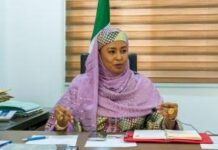Chris Otaigbe
Following the devastating effect of Covid-19 pandemic on the Crude Oil price and the crushing crash in Oil demand, Nigerian government struggles to review an oil-funded budget benchmark amid a rapidly backsliding economy.
From the originating projection of $57 down to $30 and further down to $25, government had had to make the painful adjustment of its budget benchmark to reflect current realities in revenue expectation.
Having finally approved a $25/barrel budget benchmark at its last Federal Executive Council (FEC) meeting, Ministries, Departments and Agencies (MDAs), States and Local Governments would have to begin to tweak their individual budgets to reflect the latest fiscal reality.
Whether this downward review is adequate or appropriate is an issue that has divided economists who expressed divergent views on Federal Government’s decision to drive down the 2020 budget to reflect an oil benchmark of $25 per barrel.
In interviews with the News Agency of Nigeria (NAN) in Lagos, some of them said that periodic review of the situation was very critical while others cautioned against it.
According to the NAN report, Minister of Finance, Budget and National Planning, Zainab Ahmed, had announced the plan on May 5 during a web conference on the impact of low oil prices on Nigeria’s economy.
Ahmed said the amendment process would bring down the revenue indicator to $25 per barrel.
Prof. Ndubuisi Nwokoma, the Director, Centre for Economic Policy Analysis and Research, University of Lagos, Akoka, agrees with her as he described the decision as being realistic.
“The market for crude oil is still in bad shape with a predominance of excess supply. However, with the loosening of the lockdown in many countries, global economy will likely begin to pick up with a consequent increase in the demand for oil; thus, increasing oil price.” Nwokoma said.
According to him, planning the budget on $25 per barrel benchmark implies a drastic reduction in revenue for government.
“Of course, expenditure will reduce as there is little room for more borrowing. Tough times may be ahead both for capital and even recurrent expenditures; so, a periodic review of the situation is very critical,” He said.
Similarly, Chief Martin Onovo, a political economist, insisted the oil benchmark should be adjusted to reflect current reality.
“The 2020 Budget oil benchmark price has to be reviewed to reflect contemporary realities of the international market. The outlook for oil price in the international market is presently not bright. COVID-19 disruptions and the Russia versus Saudi market-share war are the immediate causes of the current low crude prices. We have always insisted on conservative price benchmarks to shield Nigeria from this kind of shocks,” he said.
However, Dr. Boniface Chizea, the Managing Director of BIC Consulting Services, did not support any further review of oil benchmark at this time.
“We must avoid too frequent reviews of critical indices. As I observed, elsewhere, the situation is still fluid. My preference would have been that we suspend any review at this time and allow some time to monitor the trajectory of things. There is currently a weak marginal rebound of the oil price as demand increases as gradual unlocking effect gathers momentum,” said Chizea.
Chizea is optimistic that if the situation would not worsen across board to lead to further wide spread shutdown, oil price would rally, signaling the beginning of recovery.
Current market realities have actually put Nigeria in a dire strait as the fundamentals of her economy have taken a deep hit from the Covid-19 induced damage.
Africa’s most populous nation and its largest economy, Nigeria, has recorded close to 5,000 Covid-19 cases with almost 200 fatalities, as of May 14, 2020.
Last week, the country kicked off a “gradual” easing of Covid-19 lockdowns in at least three major states amid a worrying uptick in new cases ever since the restrictions were first lifted. President Buhari justified his decision by citing the “heavy economic cost” of the lockdown.
Nigeria is Africa’s largest oil producer, pumping 1.78 million b/d of crude in March. Oil sales contribute 90% of the country’s foreign exchange earnings; 60% of the revenue and 9% of GDP. With a high fiscal breakeven of $144 per barrel, Nigeria has found herself in an ominous predicament with International Oil Company (IOCs) needing $35-$40/barrel to break even.
Nigeria had applied for $7 billion in emergency funds to the African Development Bank, World Bank, and the IMF and has seen its credit rating downgraded by Fitch and S&P due to the oil slump.
In its opinion published in its May 12, 2020 edition, Bloomberg posited that whole countries, like people, can have pre-existing conditions. A particularly insidious one, it stated, is oil dependency, which can leave a state destitute, at the very moment it requires all its strength. In recent years, crises in Venezuela and Libya have sent shockwaves through the global oil market. The country to watch in this year of Covid-19 is Nigeria.
Late last month, the International Monetary Fund approved $3.4 billion of emergency funding for Nigeria. Official figures suggest the spread of Covid-19 has been relatively low, as only less than 15,000 Nigerians out of a population of more than 200 million had been tested to date.
In April, the disease claimed Abba Kyari, the powerful Chief of Staff to President Muhammadu Buhari, a political bombshell. Meanwhile, there is no denying the pandemic’s impact on oil, which accounts for roughly 10% of Nigeria’s economy.
Although Nigeria has supplied more Secretary Generals of OPEC than any other country, including the current one, she is also among the group’s weakest members. Nigeria has ranked lowest within OPEC in terms of oil export revenue per capita virtually every year this century.
A former CIA analyst who now heads global commodity strategy at RBC Capital Markets, Helima Croft, noted that as Nigeria’s population swelled, oil production dwindled, recalling years just after the 9/11 attacks.
Nigeria, having recently transitioned out of military rule, was regarded as a potential “fulcrum of U.S. energy policy,” supplying more barrels from outside the Middle East. Back then, it produced more than two million barrels a day, of which about 40% was shipped to the U.S., and Croft remembers projections at the time for production to double.
Unfortunately, things never worked out that way.
An associate fellow at Chatham House, a London-based think tank, and former U.S. intelligence expert on Nigeria, Matthew Page, said lack of investment in the oil sector has been Nigeria’s challenge pre-dating Covid-19 by at least a decade.
Unrest in the Niger Delta since the 1990s intensified after 2003 with attacks directed increasingly at oil infrastructure. This, combined with persistent corruption, deterred foreign oil companies.
By the mid-2010s, with shale oil starting to transform the Atlantic oil market, there was even less reason to invest in Nigerian barrels. President George W. Bush was the last U.S. president to visit a country whose oil supply is no longer viewed in Washington as critical; President Donald Trump slapped immigration restrictions on Nigeria in February.
Coming amid mounting expectations of peak oil demand anyway, Covid-19 crisis means even less incentive for foreign oil companies to deploy scarce dollars there.
Sitting at the nexus of Nigeria’s politics, economy and security, Oil generates more than half of government revenue, accounting for only about one-tenth of GDP.
And government revenue can also be thought of, as a form of oil, greasing the complex machine that is Nigeria: more than 200 million people split among more than 300 ethnic groups, encompassing Islam and Christianity and spread across 36 states.
While the economy is relatively diversified, many Nigerians rely on subsistence farming or work for the civil service. Nigeria is estimated to account for one in seven of the world’s poorest people.
Outside of Lagos, large parts of the country rely heavily on oil-funded allocations from Federal government. According to Bloomberg, peace deals with militant groups are sealed with cash. And the government funds security forces fighting Boko Haram’s jihadists in the northeast of the country.
Africa Program at the Center for Strategic and International Studies, a Washington-based think tank Director, Judd Devermont, said where this becomes problematic, in terms of socio-political dynamics, is that oil money is one way in which Nigeria smooths over its poor governance and its lack of services.
Despite its fault lines and weaknesses, Nigeria has endured multiple crises in the past. What’s different this time is the sheer multiplicity of problems against a backdrop of weak oil prices especially at a time when the medium and long-term health of the oil market is already in question.
Should the destructive effect of Covid-19 persist, the federal government may become incapacitated in the area of allocation to states even with all of $72 million in its rainy-day fund, and this means obligations piled up on the back of expected Oil money may not be attended to.
With a dwindling revenue source, it is all too easy to imagine a vicious circle developing whereby the government struggles to pay off militants in the Delta region, who then resort to the old tactic of disrupting oil supply, thereby exacerbating the lack of funds.
The risk of economic and political disruption in Africa’s biggest oil exporter is rising. Today’s market, choking on its own supply, may not particularly care right now.
An inherently fragile system, beset by corruption, regular bouts of violence, economic mismanagement and weak institutions held together with oil rents, Nigeria’s situation also shares something in common with other petro-States, despite manifestations of certain unique characteristics.
The crisis for Nigeria isn’t so much that oil prices are low; rather that it is hardwired for much higher prices. The oil market’s slow-burning crisis is that so much of its supply depends on powerful OPEC members such as Saudi Arabia.
Ranked 146 out of 180 in Transparency International’s “Corruption Perceptions Index 2019,” for Nigeria, corruption remains the major challenge to its capacity to navigate her economy out of this ebb.
As Oil keeps hovering around $30 on the back of a gradual easing of the global lockdown, Nigerian government cannot afford to relax on its oars, believing the worst is over.
Hurts arising from dynamics thrown up by the punishing impact of the Covid-19 induced lockdowns of the global economy may not wear off quickly enough for a developing country as Nigeria to recover in the short term.
It would serve the economy of the well, therefore, if the government work within a worst-case scenario prism in order to have the fiscal space to lift the economy from the valley it has found itself presently.
To this end, pegging the budget at a $10 benchmark would provide a far more liberal environment for the government to manage the current reality, while it gets the needed fire to move for a more decisive and determined diversification of the economy.
It is safer to err on the side of surplus through a worst-case benchmark than to stumble on a shaky projection that would put the fiscal state of the budget and the economy on an avoidable slope.
In other words, in a $30/ barrel bar, a $10 benchmark would safely breed a budget surplus that would be hovering around $20. On the other hand, running thin on $25 benchmark, means the 2020 appropriation would have to hold its breathe nervously on an uncertain $5 surplus.
Considering the predicted second wave of this deadly and economy-battering virus, it would be advisable for managers of the Nigerian economy to learn from the horrific experience we encounter with the first.
With a six to seven trillion-dollar damage to economies on a global scale and a telling $200 billion lost to the pandemic by sub Saharan African economy, it does not look like there is any economy that would be able to withstand another wave of this virus.
Usually, when a country’s economy is in crisis, other countries will come to its aid. Unfortunately, in a situation where virtually all developed economies are in trouble arising from self-inflicted lockdowns and consequent economic shutdown, it is not likely that Nigeria would receive the adequate assistance it desperately requires to lift her economy out of the doldrums it is today.










